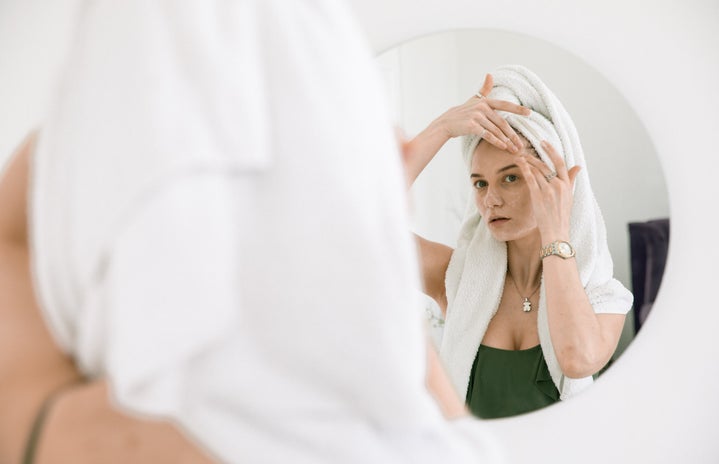Canvassing A 22 Year Old’s Wrinkles: Aging in the Age of Anti-Aging

This article is written by a student writer from the Her Campus at Brown chapter.
I am 22 and afraid of aging.
Given the average lifespan is 82 years, my fear may seem unfounded, laughable even, but if you have scrolled through Instagram or TikTok recently, you may be more sympathetic to this sentiment.
Across social media, you will find young females, often as young as middle school age, touting extensive, multi-step skincare routines, expensive products, and invasive facials. Endless Drunk Elephant, The Ordinary, and SkinCeuticals litter their pristine vanities. Start with toner, add an exfoliating cleanser, finish with a hydrating serum, and plumping lotion. On the more extreme end of the spectrum, injections and botox are also on the rise among young women who want to stave off signs of aging and wrinkles.
Between 2019 to 2022, there was a 71% increase in neuromodulator injections for women in their twenties.
As a young woman, it is hard to ignore these pervasive trends that infiltrate my social media with the message that aging is bad and must be avoided at all costs. Youth and beauty are a woman’s worth, her social capital. Once that is lost, we are rendered utterly undesirable and useless to society, lest we become a mother or grandmother and can therefore provide our worth in children. In the age of social media, a woman’s image is paramount to how she is perceived. Social media feeds push out any sign of “ugliness” and crowd our for you pages with stereotypical images of beauty. A woman could be incredibly accomplished, talented, or intelligent, but this is all tainted by an out of place wrinkle or gray hair. It becomes the obligation of the young woman to cover or correct these signs of aging, so they can avoid being assessed as “letting themselves go”.
One could simply laugh off the trends and fads as simply the ridiculous nature of social media, which is inherently image focused, but research shows these narratives impact the workplace as well. Employers are more likely to hire and promote women based on their perceived attractiveness level, much of which is rooted in youth and European beauty standards. Youth equals beauty and beauty equals currency. Currency for likes on social media, currency for jobs, currency for wealth.
All of this is not to convince you to go to Sephora today and buy a paycheck’s worth of serums and lotions, it is to allow us to take a step back and analyze the hypocrisy behind our collective obsession with anti-aging. Do you see men buying skincare products and botox injections at the same rates as women? Are men fanatical over shrinking their wrinkles, lest they do not get the promotion they desire? Are men concerned over their declining social capital every subsequent birthday? These are questions to merely ponder as you critique the smile line in the corner of your eye or contemplate the investment in “baby botox”.
As we age, we gain years of untouchable wisdom, wrinkles that represent hours of laughing, smiling, and yapping, discoloration from days spent basking underneath the sun, and gray hairs that may be from the nights spent stressing over a homework assignment that ultimately made us a little smarter.
I am 22. I am still afraid of aging. And I am starting to teach myself that my youth is not my currency. I would like to believe I am worth more than my lineless face that I will inevitably let fade to wrinkles.
<p>The post Canvassing A 22 Year Old’s Wrinkles: Aging in the Age of Anti-Aging first appeared on Her Campus.</p>
Welcome to Billionaire Club Co LLC, your gateway to a brand-new social media experience! Sign up today and dive into over 10,000 fresh daily articles and videos curated just for your enjoyment. Enjoy the ad free experience, unlimited content interactions, and get that coveted blue check verification—all for just $1 a month!
Account Frozen
Your account is frozen. You can still view content but cannot interact with it.
Please go to your settings to update your account status.
Open Profile Settings